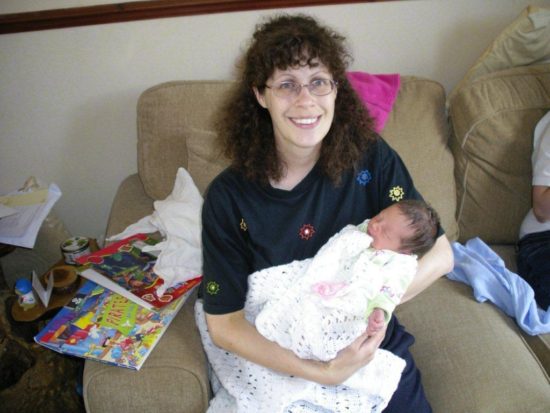Amy Sparkes explains how she coped with intrahepatic cholestasis of pregnancy (ICP), formerly known as obstetric cholestasis (OC), and the severe itching that is one of the main symptoms, during her three pregnancies.

I suffered from intrahepatic cholestasis of pregnancy (ICP) in two previous pregnancies so when I was expecting my third baby I was looking out for the symptoms, in particular “the itch”.
A common symptom of ICP is itching and, for me, it was at its worst on the palms of my hands and my ankles.
ICP is a liver disorder that occurs during pregnancy where the flow of bile from the liver is reduced, leading to raised bile acids in the blood.
In my previous pregnancies I had often scratched so madly I would bleed. The only way I could sleep at night was with wet, cold flannels draped over my feet. Itching sounds like such a mild problem, but the frequency and intensity of it, especially when it keeps you from sleeping, is far from mild.
I knew from my previous pregnancies that liver function tests and bile acids should be done early in pregnancy.
I also knew itching can occur without any increase in the blood test results and, because of my history and symptoms, that I should have blood tests regularly.
However, despite my symptoms, my hospital was reluctant to do a bile acid blood test (the best test to diagnose ICP). They insisted that ICP is a condition which only presents in the third trimester, but I knew that it can actually start as early as the first.
After repeatedly voicing my concerns, and with the backing of my liver consultant, I finally managed to get a bile acid test at 18 weeks, which came back at 14 (normal levels are 0-14).
I felt let down but I was so exhausted from lack of sleep and stress that I didn’t have the energy to fight anymore.
I was really disappointed when the hospital then refused to do further bile acid tests until I reached the third trimester. I felt let down but I was so exhausted from lack of sleep and stress that I didn’t have the energy to fight anymore.
When my bile acids came back at 24 weeks they were over 100. I was put on Ursodeoxycholic Acid to reduce the levels and help the itching, but then told there would be no
more blood tests to monitor the condition.
Many hospitals manage this condition by suggesting induction at 37-38 weeks as research suggests the risks to the baby increase after 37 weeks. But I was told my hospital would not consider induction despite my bile acids being so high.
The following weeks were very stressful and I couldn’t help but feel concerned for my baby. Finally, at 35 weeks, I decided to transfer to another hospital.
There I was given amazing care – foetal heartbeat checks and blood tests twice a week which enabled us to monitor the condition – and I felt far more reassured.
I was eventually admitted for induction and I’m delighted to say my baby girl arrived safely at 37 weeks.
Now I spend time on the ICP Support UK forum helping other pregnant women. It can be hard for people who have never experienced “the itch” to understand how awful it is. I know when I was suffering that talking to someone who had been through it – and survived – was a tremendous help.
More research and funding is desperately needed to discover more about the condition and to find out which ICP babies are at risk and why.
Every ICP family should have the happy ending we did.
For information and support after a challenging experience of pregnancy, birth or parenthood, call our helpline on 0300 330 0770.
ICP Support provides support and information to women who have, or who may have, the condition, and their families, and also keeps up-to-date on the most recent research into the condition.